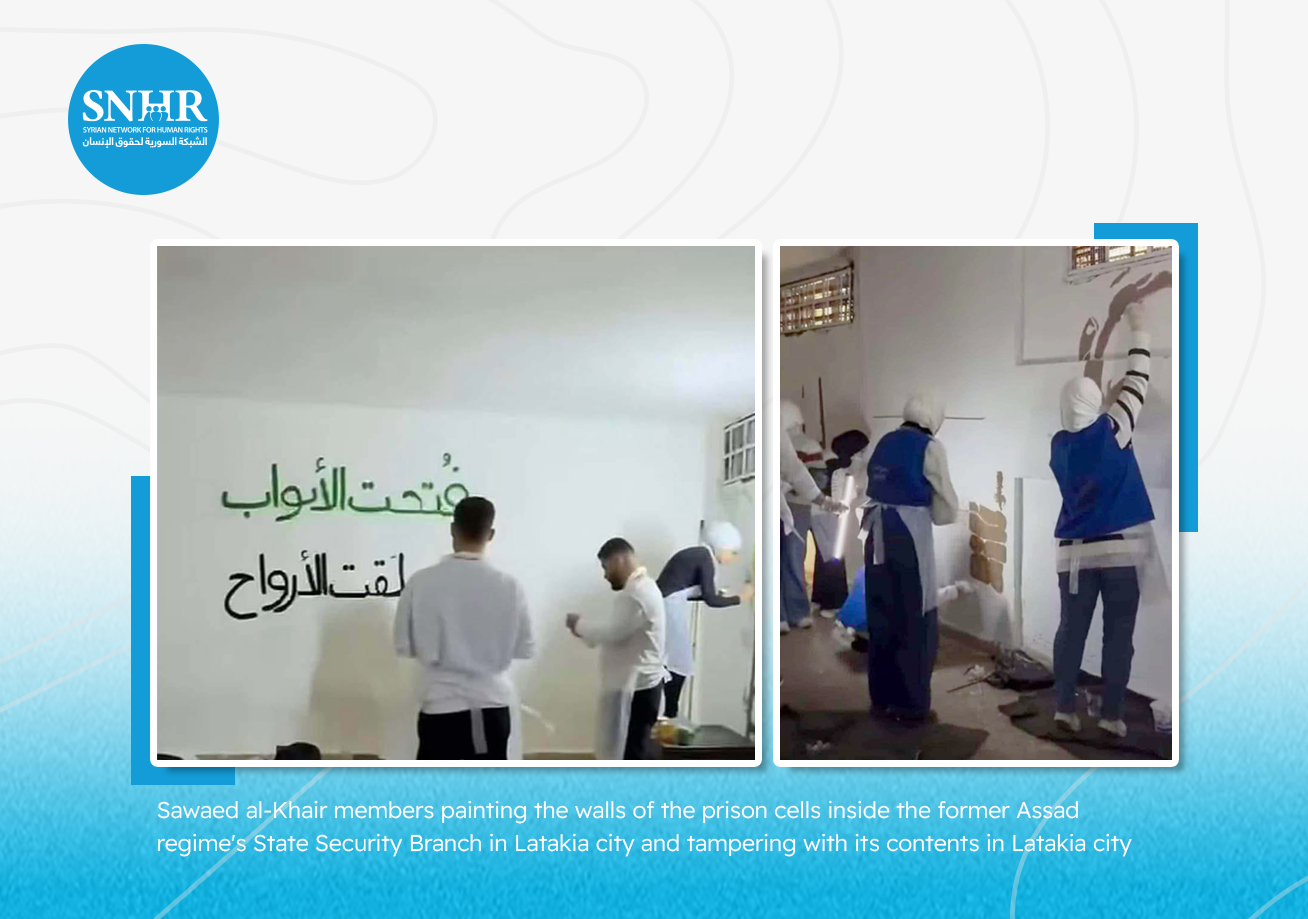SNHR Reiterates its Calls on the Current Syrian Government to Protect Crime Scenes and Prevent Unauthorized Access

Available In
The Hague – The Syrian Network for Human Rights (SNHR) released a statement stressing that the current Syrian government must investigate the Sawaed al-Khair (Goodwill Arms) volunteer group following their tampering with crime scenes, and reiterating our calls on the current Syrian government to protect crime scenes and prevent unauthorized access.
The statement notes that, on January 13, 2025, the Sawaed al-Khair volunteer group posted a video on their Facebook page showing members entering a Syrian detention center in Latakia in Syria. The video depicted members of the group painting the walls of the facility and tampering with its contents. SNHR’s statement adds that this irresponsible behavior poses a direct threat to efforts to document the violations that are believed to have taken place at this facility, to determine the fate of detainees who were held there, and to hold those involved in their torture accountable.
The statement sheds light on the consequences of tampering with crime scenes, noting that international laws criminalize tampering with crime scenes, with penalties potentially including up to 20-year prison sentences, substantial fines, or both. Such actions are often intentional, aiming to obscure evidence. In this context, the statement stressed that tampering with crime scenes undermines justice and delays efforts to identify perpetrators and hold them accountable.
The statement also outlines SNHR’s view on this incident. In the course of Operation Deter Aggression that took place a few weeks ago, SNHR issued a set of recommendations regarding the importance of managing prisons and detention centers. Since the opening of prisons and detention centers, however, we have documented numerous cases of unauthorized access and tampering with crime scenes. In response, we released a statement entitled, ‘Protecting Crime Scenes in Syria: The Role of Ruling Authorities and Their Legal Responsibility” underlining the necessity of preventing unauthorized access to these sites in accordance with international laws and protocols. The statement reiterates again that access to such sites should be limited to:
- Legally authorized personnel, such as:
- Law enforcement officers: Responsible for securing the crime scene, defining its boundaries, controlling access, and documenting evidence.
- Forensic experts: Tasked with collecting, analyzing, and preserving evidence to ensure its admissibility for use in investigations.
- Forensic doctors: Specializing in examining bodies and determining preliminary causes of death.
- Legal representatives: Such as public prosecutors and legal experts, who supervise evidence collection and ensure compliance with legal standards.
- A strict legal framework, including:
- Declaring the area as a crime scene under police supervision.
- Requiring a search warrant to obtain access, especially if the sites are privately owned.
- Adhering to international standards when dealing with sensitive locations, such as mass graves.
The statement strongly condemns the unauthorized intervention of the ‘Sawaed al-Khair’ team, even if this was given official permission. The statement further asserts that such activities should be limited to legally competent authorities to ensure the protection of evidence and the integrity of investigations.
The statement includes a number of recommendations by SNHR:
- Launch an urgent investigation into the incident and hold those responsible for this violation accountable, as it poses a threat to the preservation of crime scene evidence.
- Protect evidence from environmental damage by providing appropriate means of protection, such as tarpaulin covers.
- Documentation and preservation
- Accurately photograph the crime scene from multiple angles.
- Maintain a comprehensive record of every item handled.
- Safe handling of evidence
- Use specialist techniques and tools for evidence collection.
- Store evidence in tamper-proof containers.
- Coordinate with civil society organizations to safeguard evidence and organize awareness campaigns.
- Strengthen legal frameworks
- Enact legislation prohibiting any tampering with crime scenes.
- Impose penalties on violators.
- Media awareness
- Train journalists in responsible reporting of sensitive issues.
- Coordinate with authorities when covering sensitive sites.
In conclusion, the statement emphasizes that the protection of crime scenes and evidence is essential in achieving accountability and reconciliation. The authorities are obligated to fulfill their legal responsibilities to ensure the prosecution of perpetrators and justice for victims.


